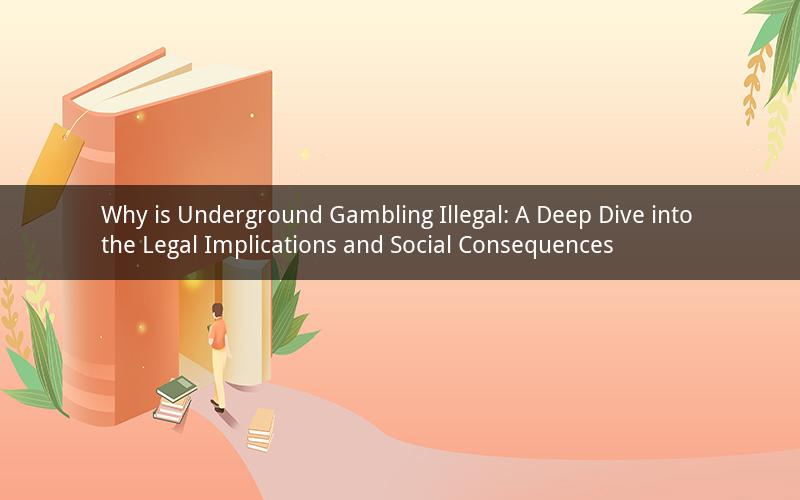
Underground gambling, also known as illegal gambling or black market gambling, has been a subject of controversy and debate for decades. The illegal nature of this activity raises questions about its morality, legality, and the broader implications it has on society. This article explores the reasons behind the illegality of underground gambling, examining various angles, including legal implications, social consequences, and the role of government in combating this issue.
1. Legal Implications
The legality of gambling varies significantly from one country to another. While some countries have fully regulated the gambling industry, others have imposed strict laws against it. Underground gambling is illegal primarily due to the following legal implications:
a. Tax Evasion: Illegal gambling operations avoid paying taxes that are levied on legal gambling activities. This results in significant revenue loss for governments, which could otherwise be used for public services and infrastructure development.
b. Fraud and Corruption: The lack of regulation in underground gambling makes it susceptible to fraud and corruption. This can lead to the exploitation of individuals, as well as the manipulation of gambling outcomes.
c. Money Laundering: Illegal gambling can be used as a platform for money laundering, making it difficult for law enforcement agencies to track the origins of illicit funds.
2. Social Consequences
The social consequences of underground gambling are equally concerning, as they can lead to various negative outcomes:
a. Addiction: Illegal gambling can contribute to gambling addiction, as individuals may seek out these unregulated platforms to fulfill their gambling needs. This can lead to financial, emotional, and psychological problems for both the individuals and their families.
b. Crime: The illegal nature of underground gambling can lead to increased crime rates, as individuals involved in these activities may resort to illegal means to maintain their operations and profit margins.
c. Social Exclusion: Illegal gambling can contribute to social exclusion, as individuals who engage in this activity may be marginalized by society due to the negative stigma associated with it.
3. The Role of Government
Governments play a crucial role in regulating the gambling industry to prevent the negative consequences of underground gambling. Here are some of the strategies employed by governments:
a. Legalization and Regulation: Governments can choose to legalize and regulate gambling, ensuring that it is conducted under strict rules and regulations. This can help reduce the appeal of underground gambling and provide a safer environment for individuals to engage in gambling activities.
b. Law Enforcement: Governments can deploy law enforcement agencies to crack down on illegal gambling operations, seize illegal proceeds, and prosecute those involved in the illegal activities.
c. Public Awareness and Education: Governments can conduct public awareness campaigns and educational programs to inform individuals about the dangers of underground gambling and promote responsible gambling habits.
Frequently Asked Questions:
1. What is underground gambling?
Underground gambling refers to gambling activities that are conducted outside the legal framework, often without proper licensing or regulation.
2. Why do some people prefer underground gambling over legal gambling?
People may prefer underground gambling due to the thrill of participating in unregulated activities, the potential for higher stakes, or the belief that legal gambling is not fair or transparent.
3. Can underground gambling be controlled effectively?
While it is challenging to completely eliminate underground gambling, governments can implement measures such as legalizing and regulating the gambling industry, enhancing law enforcement efforts, and raising public awareness to minimize its prevalence.
4. What are the potential consequences of legalizing underground gambling?
Legalizing underground gambling could lead to increased tax revenue, reduced crime rates, and a safer environment for individuals to engage in gambling activities. However, it could also lead to increased gambling addiction and other social issues if not properly regulated.
5. How can individuals protect themselves from the risks associated with underground gambling?
Individuals can protect themselves from the risks associated with underground gambling by avoiding unregulated platforms, seeking help if they suspect a gambling addiction, and engaging in responsible gambling practices.